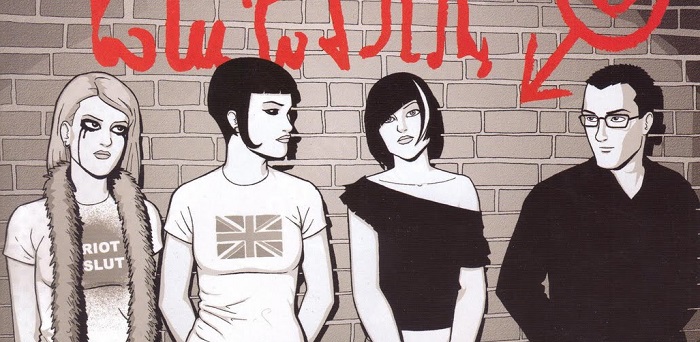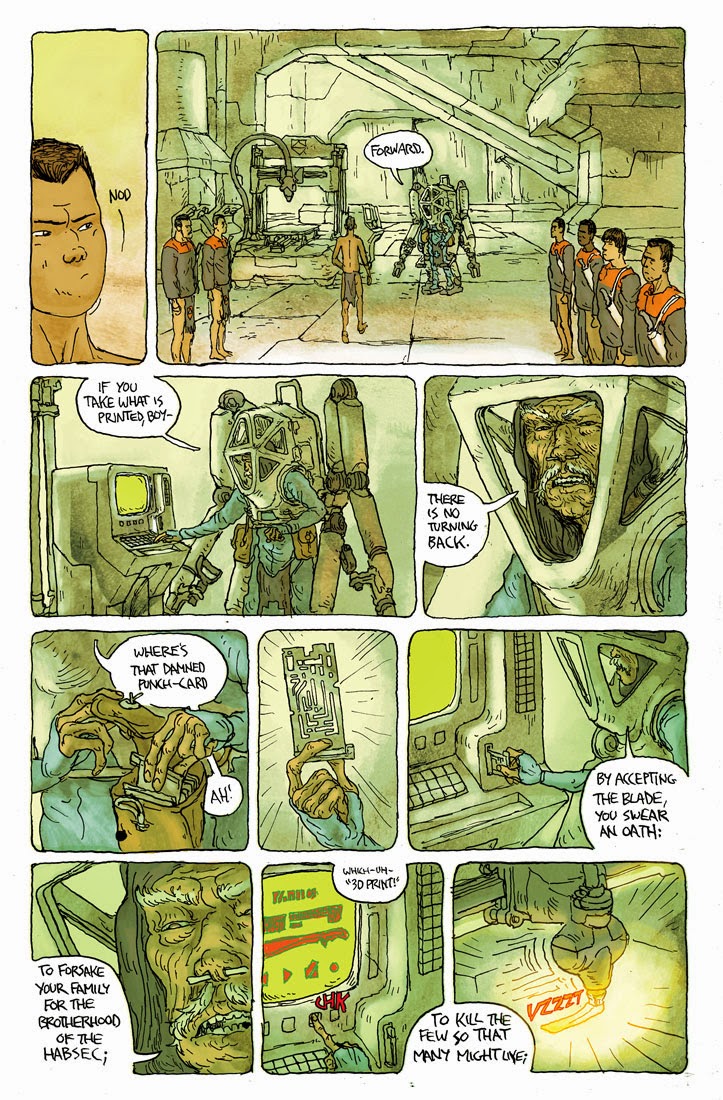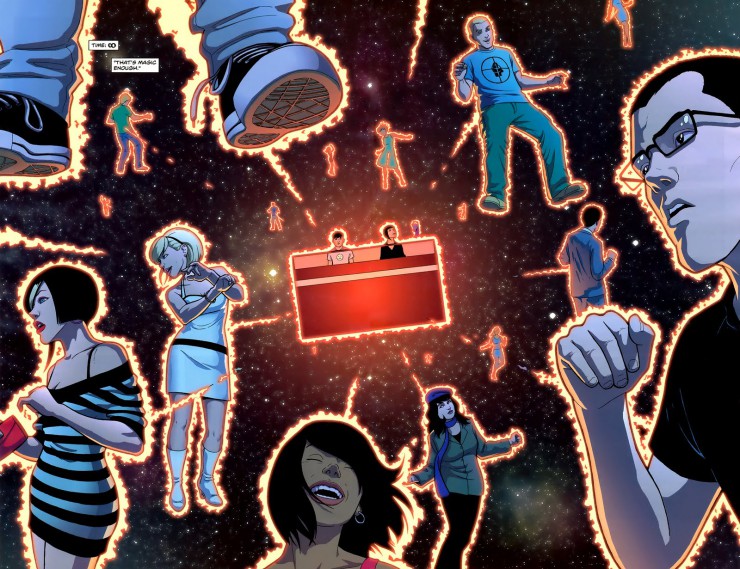We all love comics, but sometimes it’s nice to get outside the mainstream, and what better publisher to do that with than Image Comics? This summer, the creator-ruled publisher released Island by Emma Ríos and Brandon Graham and raised from the dead Phonogram by Kieron Gillen and Jamie McKelvie. Neither series could exist in the Big Two; they’re just too far from anything Marvel or DC or any of their subsidiaries are doing. Neither publisher has done anything in the way of a comics magazine in years, even though some of your favorite superheroes were born in anthologies (looking at you, Spider-Man). And while urban fantasy and magical realism are crowding the literary field right now, there are few mages in comics. So, if you’re looking for something new, exciting, and unlike anything else out there, you’re in luck.
Origin Stories
Island
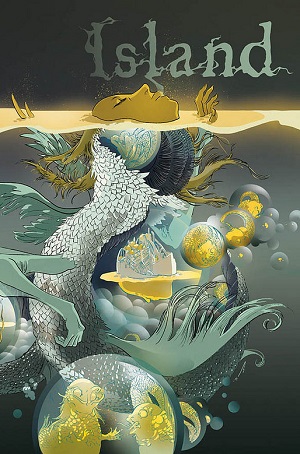 Issue #1 introduces “I.D.,” a new story by Emma Ríos about a group of people using experimental brain transplants to tackle their identity issues. Brandon Graham returns to the world of “Multiple Warheads,” where werewolf Nikoli and his girlfriend Sexica have grand adventures in an alternate version of Russia, complete with anthropomorphic denizens. Newbie Ludroe tells of a skateboarder named Reno, who gets tangled up in an interdimensional battle between a gang of cats and a mummy while searching for her missing friend. Ludroe and Ríos’ stories wrap up in issue #2, just as Simon Roy starts his three-part blood-soaked tale of a young warrior on the verge of uncovering the dark truths upon which his civilization is founded.
Issue #1 introduces “I.D.,” a new story by Emma Ríos about a group of people using experimental brain transplants to tackle their identity issues. Brandon Graham returns to the world of “Multiple Warheads,” where werewolf Nikoli and his girlfriend Sexica have grand adventures in an alternate version of Russia, complete with anthropomorphic denizens. Newbie Ludroe tells of a skateboarder named Reno, who gets tangled up in an interdimensional battle between a gang of cats and a mummy while searching for her missing friend. Ludroe and Ríos’ stories wrap up in issue #2, just as Simon Roy starts his three-part blood-soaked tale of a young warrior on the verge of uncovering the dark truths upon which his civilization is founded.
The issues also contain illustrated essays and gorgeous opening artwork. Kelly Sue DeConnick crafts a deeply personal story encompassing addiction, horse racing, and her late friend. In the second issue, Miguel Alberte Woodward drops some science on the plausibility of Ríos’ world, and Robin Bougie relates the curious biography of an Italian hijacker. Marian Churchland’s oil paintings of the sea surrounding the eponymous island are immersive and rich, but I’d give many, many dollars for Will Kirkby’s fantastically intricate monster-inhabited dystopia opening the second issue.
Ríos and Graham conceived and executed the comics anthology magazine—100-ish pages, no ads, highlighting creators from all over the world telling unusual stories—with the publishing assistance of Image Comics. The first issue dropped in July 2015, and #3 is scheduled for September 16.
Phonogram
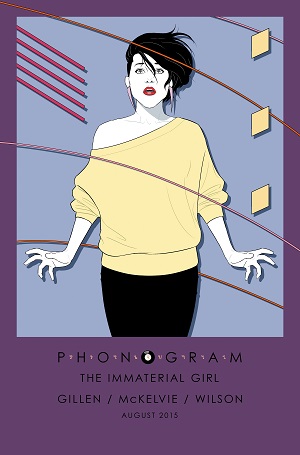 Rue Britannia, the first volume of Kieron Gillen and Jamie McKelvie’s Phonogram series, introduces phonomancer David Kohl, a music geek who can convert his uber nerditry into magic. David is being haunted by an long-dead ex girlfriend and tormented by a very pissed-off dead goddess. He returns in The Singles Club, which examines a single chaotic night at a club from seven different phonomancer perspectives. Emily Aster, David’s former coven leader, helms The Immaterial Girl. We saw her split personality in her segment in The Singles Club, and here that story takes center stage as we learn about her Faustian bargain where she traded her personality for magic. This isn’t Young Avengers set to music, and though the seeds of The Wicked + The Divine are there, Phonogram is an altogether different beast.
Rue Britannia, the first volume of Kieron Gillen and Jamie McKelvie’s Phonogram series, introduces phonomancer David Kohl, a music geek who can convert his uber nerditry into magic. David is being haunted by an long-dead ex girlfriend and tormented by a very pissed-off dead goddess. He returns in The Singles Club, which examines a single chaotic night at a club from seven different phonomancer perspectives. Emily Aster, David’s former coven leader, helms The Immaterial Girl. We saw her split personality in her segment in The Singles Club, and here that story takes center stage as we learn about her Faustian bargain where she traded her personality for magic. This isn’t Young Avengers set to music, and though the seeds of The Wicked + The Divine are there, Phonogram is an altogether different beast.
Gillen wrote all three series, and McKelvie did the art. In Rue Britannia, McKelvie handled lettering, save Drew Gill on the third issue. The Singles Club added Matthew Wilson on colors. Immaterial Girl #1 not only continue to expand the cast of characters but production as well with the return of colorist Wilson and the addition of letterer Clayton Cowles and flatter Dee Cunniffe. The bonus material at that back of that issue includes two shorts, “Everything and Nothing” (art by Sarah Gordon) and “Blurred” (artist Clayton Cowles and colorist Kelly Fitzpatrick). Issue #2 is scheduled to drop September 9.
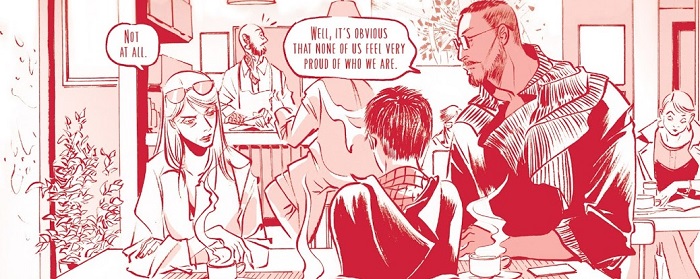
To Pull or Not To Pull
I came into Island mostly blind. Ríos and DeConnick were the only creators I had any familiarity with, and the former only as an artist. Alt comics are a subgenre I’d always planned to delve into but never got around to it. And anthologies aren’t usually my jam. But none of that mattered. After seeing teasers for it at Image Expo back in January, there was no way it wasn’t going on my pull list. If Image was backing a bunch of relative unknowns (at least as far as the mainstream goes), it was obviously worth buying.
My favorite piece in the anthology thus far wasn’t a comic at all but DeConnick’s “Railbirds.” In it, she eulogizes her close friend, writer Maggie Estep, who died of a heart attack last year. Using horse racing as a frame, DeConnick fills her stream-of-consciousness-esque autobiography to explore addition, recovery, and how we measure our self-worth against others. Ríos’ illustrations complement the work and give the words some texture, but the text could easily stand on its own.
Simon Roy’s contribution was a treat from start to, well, pause, I guess, since we won’t get the end until a future issue. “Habitat” is set in a world so far into the future that civilization has circled back into the past. Think the Eloi crossed with the Aztecs. Cho earns his warrior status after capturing and killing some resistance fighters. One of them drops a computer punch card, which Cho uses to inadvertently create a frightening new weapon. When his superiors contrive to kill him he flees into the wilderness. The story is simple yet intriguing, and the artwork stunning. And I do mean stunning. Every panel is crammed with details (he has a lot in common with Kirkby in that way), and the combination of heavy lines and almost lurid coloring makes the comic pop off the page. I liked every comic in the two issues, but I absolutely loved “Habitat.” Out of all the new writers and artists the anthology has brought to my attention, it’s Roy I’m most fascinated by. If the aim of Island is to bring attention and fans to new creators, Ríos and Graham and succeeded with Roy.
Way back in November 2005, Kieron Gillen announced on his blog a new series he and Jamie McKelvie were developing called Phonogram. He described it as “my love letter to music. It’s an honest letter—I’ve been shacked up with her for long enough to know that she’s a bitch with a cruel tongue and will happily destroy people on a whim—but it’s still hopelessly in love with her. Songs have made me kinder, crueller, smarter, dumber, funnier, happier, sadder, better and worse, and Phonogram is me and McKelvie telling you all about it.” Out of all the reviews, synopses, and discussions I’ve read about Phonogram, nothing comes as close to hitting the nail on the head as that paragraph.
For many people, music is magic. Music marks most of the major the turning points in my life. TLC’s CrazySexyCool was the first piece of music I ever purchased with my own money, and I wore that cassette tape out. The beginning of my fall from Christian salvation to unencumbered atheism began with Nine Inch Nails’ The Fragile, an album I bought on a whim because I quite liked “Closer” and was curious about Reznor’s other stuff. I decided to get a summer job because I wasn’t making enough in my allowance to buy music, a realization I made during a devastating trip to Target when I had only enough cash for one CD and couldn’t decide between Hanson and Jewel (yes, I know, the ’90s were a dark time for pop). That job was as an education guide at a theme park, which eventually led my to my love of public service and education and my deep loathing for money-grubbing corporate environments, which led directly to my wonderful career as a librarian. I can still remember the exact moment I first heard The Dresden Dolls: It was at midnight during my final semester of college, when my local rock station let listeners play mixtapes for an hour. A decade later, Amanda Palmer is basically my spirit animal and a major reason I am the kind of person I am. And don’t even get me started about how the early records of Death Cab for Cutie was the soundtrack to the malaise of my early 20s.
I’ve written before about how great Gillen and McKelvie are as a team and how exceptional their talents are, so in lieu of repeating myself, let’s just leave it at “they’re frakking awesome.” Through Gillen’s signature prose and McKelvie’s unique art, Phonogram is one of the best things they’ve ever created. You don’t have to get the musical references in order to understand their significance to the story—hell, I worked at an indie record store for a while and even I don’t know them all—because how each character reacts to the bands tells you everything you need to know. There’s more to the story than just the music, but the music informs the story.
Rue Britannia was a bit of a challenge for me, but it all clicked in The Singles Club. Immaterial Girl pushes the conceit even further with another tricksy deity manipulating the vulnerable, wrapped in a grand arc of identity issues. At its heart, Phonogram is about reconciling your public/preferred and personal/true identities. It’s about growing out of the things that defined you without realizing you have, set to the tune of ’90s Britpop and mid-aughts indie rock.
Island isn’t going to be for everyone, but everyone should pick it up. With fivefold the amount of material of the average comic book for barely twice the price—that’s five stories contained within over 100 oversized pages for only $7.99—there’s really no excuse not to add this to your collection. And while you’re visiting your local comic book shop for Island, buy Phonogram: Rue Britannia, The Singles Club, and Immaterial Girl #1. The Singles Club is probably a better intro to the world than Rue Britannia, but the first volume offers a better background for David Kohl, our magical, musical guide. Especially get the issues for Phonogram if you can afford it. Gillen and McKelvie make it worth your while with issue-only bonus material that won’t appear in the trade. So, take a step outside the superhero comfort zone and talk a walk on the weird and artsy side. You won’t regret it.
Alex Brown is an archivist, research librarian, writer, geeknerdloserweirdo, and all-around pop culture obsessive who watches entirely too much TV. Keep up with her every move on Twitter and Instagram, or get lost in the rabbit warren of ships and fandoms on her Tumblr.










